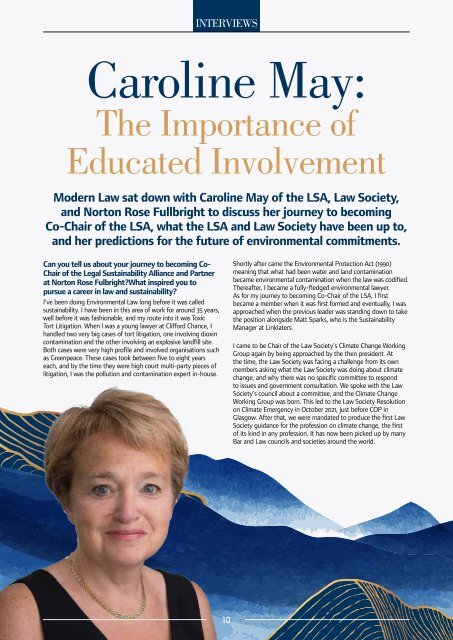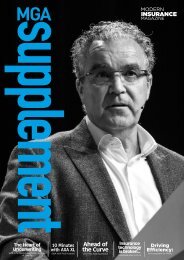Modern Law Magazine Issue 67
You also want an ePaper? Increase the reach of your titles
YUMPU automatically turns print PDFs into web optimized ePapers that Google loves.
INTERVIEWS<br />
INTERVIEWS<br />
Caroline May:<br />
The Importance of<br />
Educated Involvement<br />
<strong>Modern</strong> <strong>Law</strong> sat down with Caroline May of the LSA, <strong>Law</strong> Society,<br />
and Norton Rose Fullbright to discuss her journey to becoming<br />
Co-Chair of the LSA, what the LSA and <strong>Law</strong> Society have been up to,<br />
and her predictions for the future of environmental commitments.<br />
Can you tell us about your journey to becoming Co-<br />
Chair of the Legal Sustainability Alliance and Partner<br />
at Norton Rose Fulbright?What inspired you to<br />
pursue a career in law and sustainability?<br />
I’ve been doing Environmental <strong>Law</strong> long before it was called<br />
sustainability. I have been in this area of work for around 35 years,<br />
well before it was fashionable, and my route into it was Toxic<br />
Tort Litigation. When I was a young lawyer at Clifford Chance, I<br />
handled two very big cases of tort litigation, one involving dioxin<br />
contamination and the other involving an explosive landfill site.<br />
Both cases were very high profile and involved organisations such<br />
as Greenpeace. These cases took between five to eight years<br />
each, and by the time they were high court multi-party pieces of<br />
litigation, I was the pollution and contamination expert in-house.<br />
Shortly after came the Environmental Protection Act (1990)<br />
meaning that what had been water and land contamination<br />
became environmental contamination when the law was codified.<br />
Thereafter, I became a fully-fledged environmental lawyer.<br />
As for my journey to becoming Co-Chair of the LSA, I first<br />
became a member when it was first formed and eventually, I was<br />
approached when the previous leader was standing down to take<br />
the position alongside Matt Sparks, who is the Sustainability<br />
Manager at Linklaters.<br />
I came to be Chair of the <strong>Law</strong> Society’s Climate Change Working<br />
Group again by being approached by the then president. At<br />
the time, the <strong>Law</strong> Society was facing a challenge from its own<br />
members asking what the <strong>Law</strong> Society was doing about climate<br />
change, and why there was no specific committee to respond<br />
to issues and government consultation. We spoke with the <strong>Law</strong><br />
Society’s council about a committee, and the Climate Change<br />
Working Group was born. This led to the <strong>Law</strong> Society Resolution<br />
on Climate Emergency in October 2021, just before COP in<br />
Glasgow. After that, we were mandated to produce the first <strong>Law</strong><br />
Society guidance for the profession on climate change, the first<br />
of its kind in any profession. It has now been picked up by many<br />
Bar and <strong>Law</strong> councils and societies around the world.<br />
What are some of the key initiatives or projects that<br />
the LSA has been involved in to promote/integrate<br />
sustainability and responsible business practices<br />
among law firms?<br />
The Legal Sustainability Alliance (LSA) has been actively involved<br />
in promoting sustainability and responsible business practices<br />
among law firms through various initiatives. Carbon Footprint<br />
Reporting: Encouraging law firms to measure and report<br />
their environmental impact. Sustainable Practices Guidance:<br />
Providing guidance on energy efficiency, waste reduction,<br />
and eco-friendly procurement. Legal Sector Alliance Carbon<br />
Commitment: Collaborating with law firms committed to reducing<br />
carbon emissions. Knowledge Sharing and Events: Organising<br />
events for firms to share experiences, best practices, and discuss<br />
sustainability. Collaboration with Stakeholders: Working with<br />
legal professionals, clients, and environmental organisations to<br />
promote sustainability. Biodiversity and Nature-Based Solutions:<br />
Encouraging firms to consider biodiversity and nature-based<br />
solutions. Advocacy for Policy Change: Engaging in advocacy<br />
efforts for policies supporting sustainability in the legal sector.<br />
Employee Engagement Programmes: Encouraging firms to<br />
implement programmes that raise awareness and involve<br />
employees in sustainability initiatives.<br />
How can law firms effectively integrate sustainability<br />
practices into their operations and services, and what<br />
benefits can they derive from doing so?<br />
They can follow the guidance firstly. Sustainability has challenges<br />
and opportunities. The challenges are the supply chain, gathering<br />
ESG data from them, setting and verifying net zero targets, and<br />
other things like reducing emissions from work travel. Sustainability<br />
management needs to be integrated into a firm with a committee<br />
that every department is represented on. Enshrining environmental<br />
management principles through every area of the business is<br />
vital. The benefits from integrating sustainable practices are farreaching.<br />
Clients are expecting firms to be setting goals and striving<br />
to reach them. Sticking to environmental goals can help with client<br />
retention, and is a business-critical issue. There are also lots of new<br />
areas of law that have opened up in the profession and has allowed<br />
new and different talent to join.<br />
“Sustainability has challenges<br />
and opportunities.”<br />
“We work with some of the<br />
biggest clients in the world<br />
and that allows us to promote<br />
the agenda. Our responsible<br />
business and sustainability<br />
initiatives are something to<br />
be proud of.”<br />
Norton Rose Fulbright has been recognized<br />
for its commitment to sustainability, including<br />
its ranking in the FTSE4Good Index. Could you<br />
share some specific examples of sustainability<br />
initiatives or achievements that you’re<br />
particularly proud of within the firm?<br />
We won the first Infrastructure Journal ESG Award, and that<br />
recognized some of the work around the world, such as<br />
renewable energy projects. That kind of pioneering work is<br />
something I am very proud we were involved in. Other things I am<br />
proud of is our work within carbon capture, and working on new<br />
technology and initiatives, and energy transitions.<br />
We work with some of the biggest clients in the world and that<br />
allows us to promote the agenda. Our responsible business and<br />
sustainability initiatives are something to be proud of. How we<br />
produce and deliver our work in this area, such as our work with<br />
Save the Children, is something else I’m pleased to be a part of.<br />
NRF also does a lot of small community projects we don’t shout<br />
about, but are of equal importance to us, and our staff give<br />
up their time to volunteer in the community. I am proud of us<br />
professionally for what we do, and it is gratifying to find that it is<br />
recognized by our clients, peers, and industry leaders.<br />
10 11
















